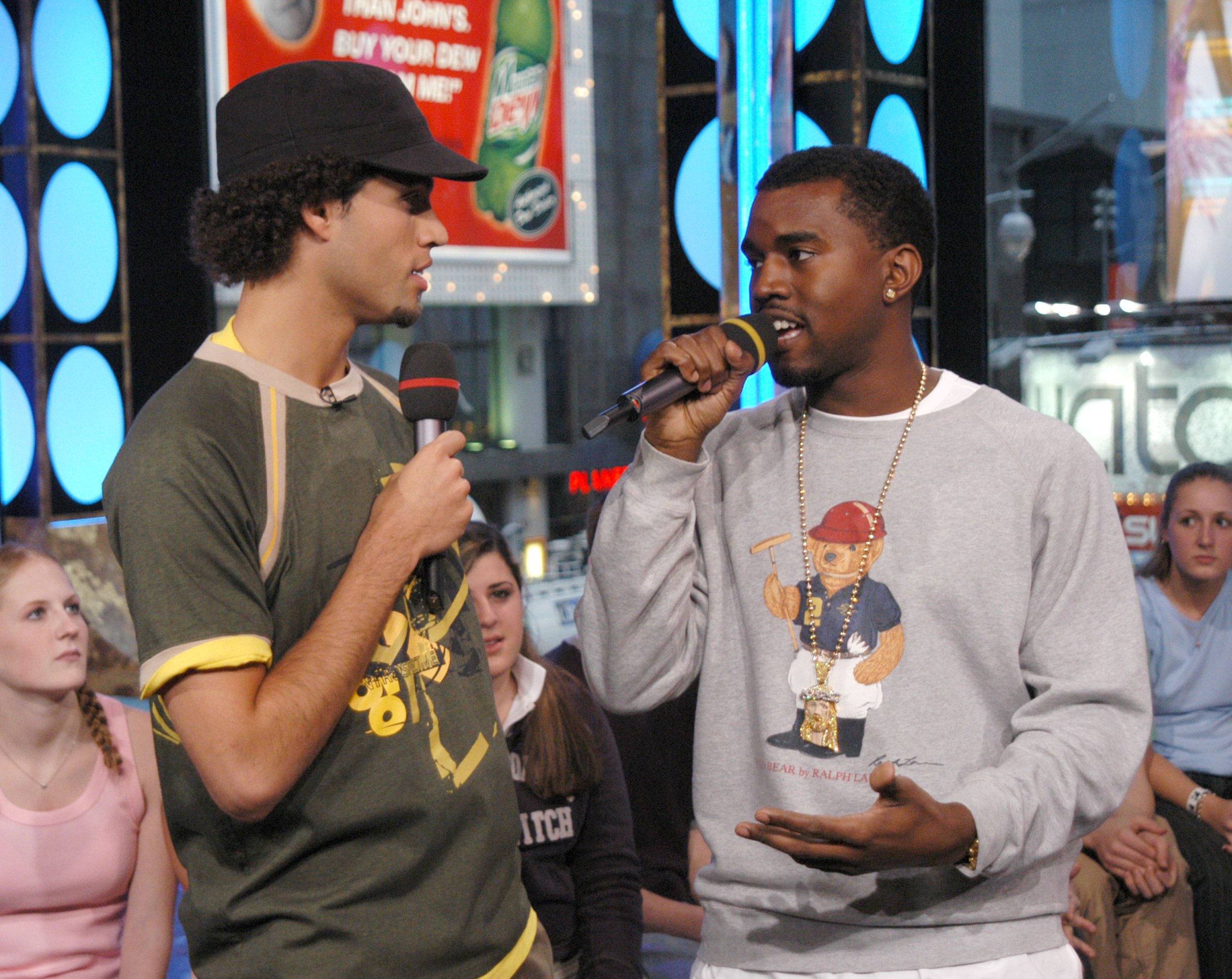
In the early 2000s, Quddus Philippe was one of pop culture’s foremost tastemakers: a charismatic host of MTV’s Total Request Live (TRL) who rubbed shoulders with Beyonce, Jay-Z, Britney Spears, and many other A-list stars. One evening in 2002, as he was ducking into the Manhattan music venue Irving Plaza to see Talib Kweli perform, a young rapper he was vaguely aware of approached him outside the venue and asked to be featured on MTV.
It was Kanye West. The moment, captured on camera by the filmmaker Coodie Simmons, shows Philippe responding politely and noncommittally: “I could talk to some people,” he says.
Within months, Philippe would become a huge fan of West as well as a friend, inviting West on TRL “any chance I got,” he tells TIME. West would return the favor by thanking Philippe in the liner notes to his debut album, The College Dropout.
And decades later, Simmons ended up using his footage of that Irving Plaza moment in his documentary trilogy Jeen-Yuhs: A Kanye Trilogy (out on Netflix Feb. 16), revealing Philippe as one of the few gatekeepers who championed a young and tenacious West during a time when he was deluged by rejections. (Jeen-Yuhs: A Kanye Trilogy is produced by TIME Studios, the film and television division of TIME.) After watching a screener of the series, Philippe caught up with TIME to tell his side of the story.
Read more: The Inside Story Behind the Kanye Docuseries Two Decades in the Making
When Philippe met West that night at Irving Plaza, he knew West almost entirely for his production work on songs by Jay-Z and Scarface. In Jeen-Yuhs, Philippe is shown looking a bit incredulous when West tells him he’s going to perform with Kweli onstage that night.
But when Philippe saw West perform the remix to Kweli’s “Get By”—which West had produced by expertly flipping a Nina Simone sample—Philippe was blown away. “I got chills the whole time,” he says. “He wasn’t waiting for permission: he came in at a 10 and stayed there the whole time. I was like, ‘Man, this dude’s ready. I’m going to put him on the platform as much as possible.’”
So that week, Philippe asked West to come by an MTV Memorial Day Picnic at Chelsea Piers. West rolled through with some of his Chicago compatriots, including GLC, Consequence, and of course, Coodie Simmons, whose footage of that day appears in Jeen-Yuhs. Philippe says that he had to convince his MTV producer that West was worth interviewing on air. “I had to work her a little bit, because at that point, he wasn’t being taken seriously as an emcee,” he says.
The pair stayed in touch, with West inviting Philippe to the studio to hear his new projects. “Ye was such an external processor. He was curious to have all the people that cared enough to tell him the truth to listen to stuff as it was incubated,” Philippe says.
In 2004, Philippe hosted West on TRL for the first time to promote The College Dropout. During the interview, West turns away from Philippe to address the crowd: “I know in the press you might read stuff and they say, ‘Kanye is arrogant’ or whatever, but I’m determined and I am self confident,” he says. Philippe later tells him: “I have a feeling you’re gonna be around at TRL for a minute, man.”
When The College Dropout was released, Philippe himself was immortalized in its liner notes, albeit incorrectly. West, hand-writing all of his shoutouts, misspelled his name as “Kadus.” West apologized when he learned about his mistake, and Philippe laughed it off. “To be credited in any way as having any positive influence on Kanye and his trajectory is an honor,” he says.
A couple years later, however, Philippe would see a different side of West when, during an episode of TRL, Philippe and his producer drew West’s ire for mentioning an incident in which Suge Knight was shot at a party honoring West. “He basically snapped, stopped listening, and started yelling at this producer who had done the pre-interview with him,” Philippe says.
Philippe says West apologized off camera, but that the incident colored Philippe’s perception of his own role in show business, in which he felt obligated to corner people about things they didn’t want to talk about. “It put me in a bit of an existential crisis about what I was doing for a living,” he says. “I felt I was not honoring our relationship: to feel an intuition of saying one thing, and then feeling the need to scratch the itch of everyone wanting to know what had happened the night before.” The next year, Philippe would depart the show for other opportunities.
Philippe is now a media and career coach, a pivot “born out of my experience with Ye: to support someone who was an emerging creator and catalyze a career of impact.” He says he loved seeing his and West’s story in Jeen-Yuhs. “Ultimately, I think it’s not about Kanye,” he says. “It’s about telling the story of how any one of us has a level of genius if we fan the flames of it.”
jeen-yuhs: A Kanye Trilogy premieres on Netflix beginning Feb. 16. Twenty-four years in the making, this documentary about Kanye West was directed by Coodie & Chike, from TIME Studios and Creative Control.
More Must-Reads from TIME
- Why Biden Dropped Out
- Ukraine’s Plan to Survive Trump
- The Rise of a New Kind of Parenting Guru
- The Chaos and Commotion of the RNC in Photos
- Why We All Have a Stake in Twisters’ Success
- 8 Eating Habits That Actually Improve Your Sleep
- Welcome to the Noah Lyles Olympics
- Get Our Paris Olympics Newsletter in Your Inbox
Contact us at letters@time.com